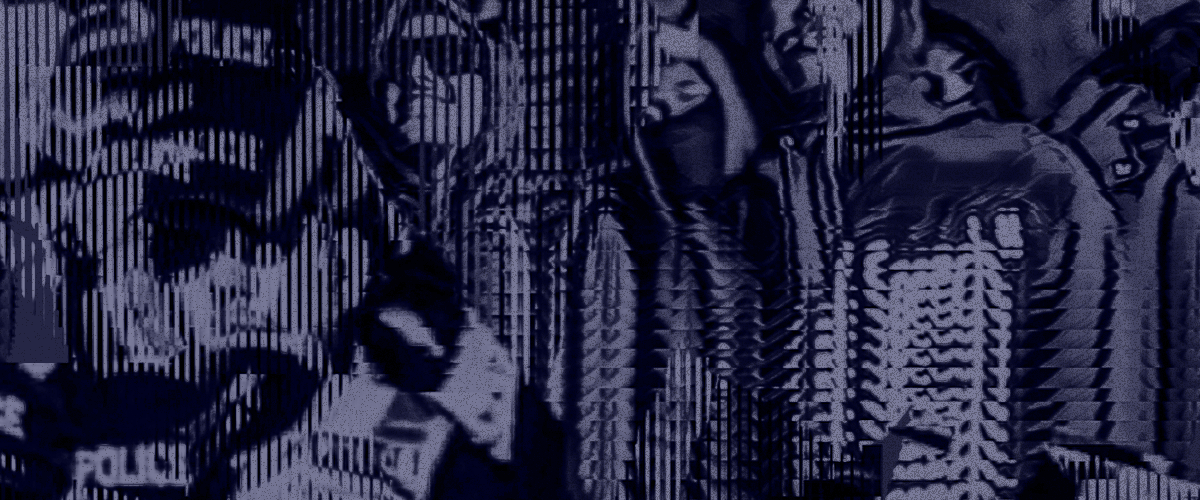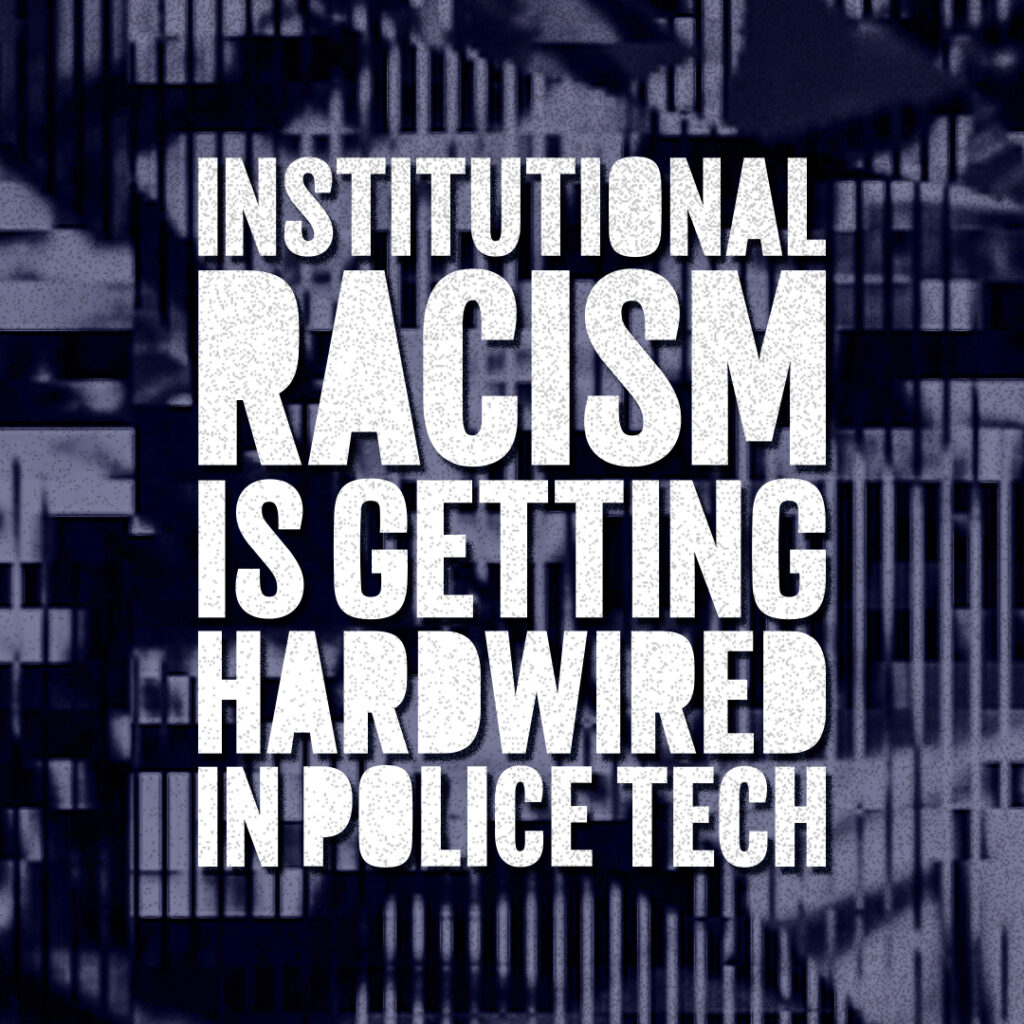End Pre-Crime
Data and content is being weaponised to criminalise people without cause fuelled by facial recognition technology, AI and surveillance.

What is Pre-Crime?
The police and criminal justice authorities are increasingly using tech, data and AI to identify people who they believe are at ‘risk’ of committing crimes. This results in people having action taken against them even though they haven’t committed a crime through joint enterprise.
Flawed technologies like facial recognition, police gang matrices, the data mining of social media and the Prevent programme undermine our presumption of innocence.
Biases embedded in these systems and ‘gang narratives’ that are used to build joint enterprise cases exacerbate discrimination that’s inherent in the criminal justice system already.
We urge transparency, scrutiny and a moratorium on the use of tech in policing that amplify systemic oppression.

AI and Predictive Policing
Online content is being mined and used as digital evidence to create gang narratives. Alongside extended criminal liability, the weaponisation of content and data is increasingly being used to imprison young Black people and people of colour for offences they have not commited.
Social media weaponisation
Police surveillance of young people and joint enterprise in the UK
Find out moreThe Prevent Duty
Prevent operates in the pre-crime space in which no offence has taken place. It is one where people are surveilled and viewed as suspicious. Prevent operates by extracting data and policing information that further securitises the spaces of marginalised and vulnerable communities.
Prevent and the pre-crime state
ORG’s report on how unaccountable data sharing is harming a generation
Find out moreShawcross review of prevent
ORG’s response to the controversial Shawcross recommendations
Find out moreMass surveillance
Live facial recognition and surveillance technology generates sensitive biometric data. Its previously disproportionate misidentifications among younger Black men in particular highlights the discriminatory nature of the technology.
FAcial recognition: no oversight, no consent
Wales cross-party group on surveillance and facial recognition technology in the UK
Find out moreHome Office CCTV: free mass surveillance?
Government programme to supply security equipment to faith institutions
Find out moreThe case against police body-worn video cameras
How police surveillance technologies may enable police abuse of power
Find out moreKEEP UP TO DATE WITH OUR CAMPAIGNS
Subscribe to our newsletter to receive updates on the latest developments affecting your digital rights.
Sign up nowThe Story So Far
Why ‘Predictive’ Policing Must be Banned
The UK Government is trying to use algorithms to predict which people are most likely to become killers using sensetive personal data of hundreds of thousands of people.Prevent Duty: Redefining terrorism in the wake of the Southport attacks
On 23 January 2025, 18 year old Axel Rudakubana was sentenced to a minimum of 52 years in prison for the horrific murder of three young girls and the attempted murder of eight other children, as well as two adults who tried to save them.Home Office CCTV: free mass surveillance?
The Home Office has for several years run a programme to supply Mosques, temples and Synagogues with security equipment including CCTV cameras.The case against police body-worn video cameras
A new investigation by the BBC has revealed a shocking incident in which Thames Valley Police officers made “sickening” comments about a woman, filmed semi-naked with police body-worn video cameras.George Floyd’s Murder, Three Years On: Insitutional Racism Hardwired in Police Tech
Three years ago today, rumblings of a global reckoning on racial injustice took place that led many people to reconsider their own experiences and roles when it came to anti-Blackness and racial discrimination.Don’t use Beyonce to normalise live facial recognition
Its deployment is nothing more than our demise from democracy.What’s wrong with ‘gang’ surveillance in the UK?
Just over one year ago, ten young Black men were charged with conspiracy to murder and conspiracy to GBH in Greater Manchester.UK Facial Recognition – No Oversight, No Consent
On 3 February 2023, the Wales cross-party group on digital rights and democracy – for which Open Rights Group serves as the secretariat – held its fourth session on surveillance and facial recognition technology in the UK.Young people criminalised for content
It’s a modern-day reality that pretty much anyone can go online today and write what they want with some form of audience available to them – whether that’s Facebook friends, Twitter followers or readers of a personal blog.‘Prevent’ and the attack on free speech
A review of the government’s controversial Prevent duty has been a long time coming.More Information
22 February, 2024
Mass Surveillance
Prevent and the Pre-Crime State: How unaccountable data sharing is harming a generation
Thousands of Prevent referrals are made each year ostensibly to “support people susceptible to radicalisation”.
Find Out More
11 July, 2023
Manchester 10: Our Response to Andy Burnham
In March 2023, we sent an open letter to Andy Burnham, Mayor of Greater Manchester, to investigate discriminatory police practices in the wake of the conviction of ten young Black men, known as the Manchester 10.
Find Out More
16 March, 2023
Mass Surveillance
Manchester 10: Open letter asks Andy Burnham to tackle discriminatory ‘gang’ surveillance
Advocacy groups and human rights organisations have written to the Manchester Mayor, Andy Burnham, and the Chief Constable of Greater Manchester, Stephen Watson, to ask them to investigate discriminatory police practices in the wake of the conviction of ten young Black men, known as the Manchester 10.
Find Out More
Press Releases
05 December, 2024
Prevent: Thousands of children referred to counter terrorism programme last year
The Home Office has published its latest Prevent referral figures, which show a slight increase in the rise in referrals compared to last year.
Find Out More
25 July, 2024
Artificial Intelligence: Safety Not Surveillance coalition calls for ban on predictive policing
The #SafetyNotSurveillance coalition – a group of organisations working at the intersections of human rights, racial justice and technology – have written to the Home Secretary calling for safeguards against the harms of AI systems in policing, including an outright ban on predictive policing and biometric surveillance systems.
Find Out More
22 February, 2024
New report reveals widespread data sharing and retention of Prevent referrals, including children’s data
A new report by digital campaigners, Open Rights Group, has found that the data of people who are referred to the Prevent programme is being widely shared, and that data is being retained for years even when referrals are marked ‘no further action’.
Find Out More
17 December, 2023
FOI request reveals extent of Prevent data sharing
An FOI request has revealed that the data of people who are referred to Prevent is being shared more widely than previously known, including with airports, ports and immigration services.
Find Out More
15 March, 2023
Manchester 10: Open letter asks Andy Burnham to tackle discriminatory ‘gang’ surveillance
Advocacy groups and human rights organisations have written to the Manchester Mayor, Andy Burnham, and the Chief Constable of Greater Manchester, Stephen Watson, to ask them to investigate discriminatory police practices in the wake of the conviction of ten young Black men, known as the Manchester 10.
Find Out More

